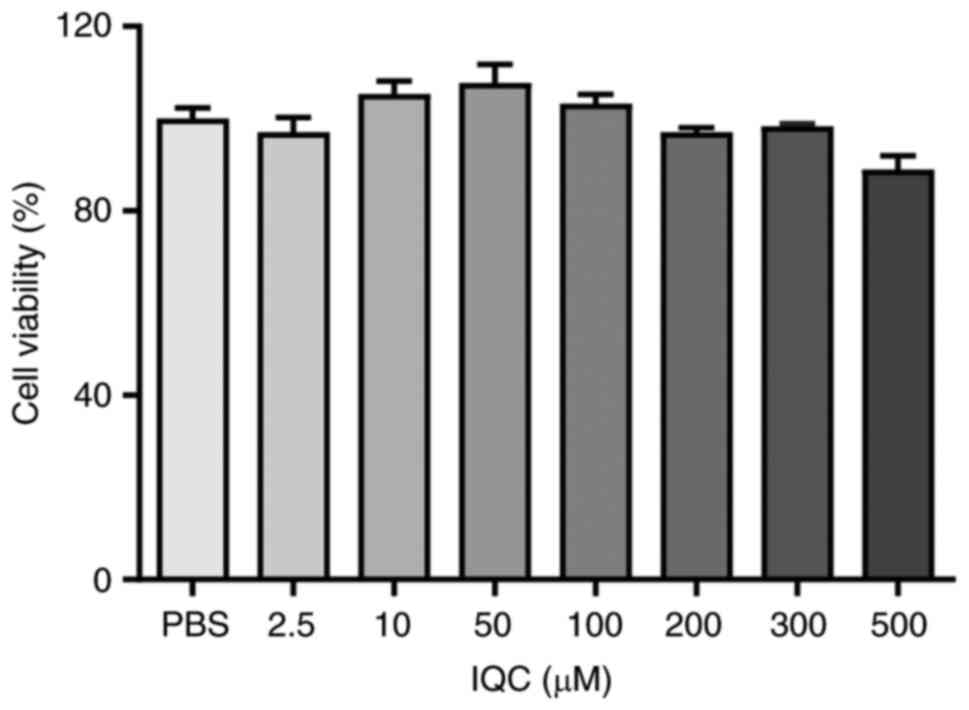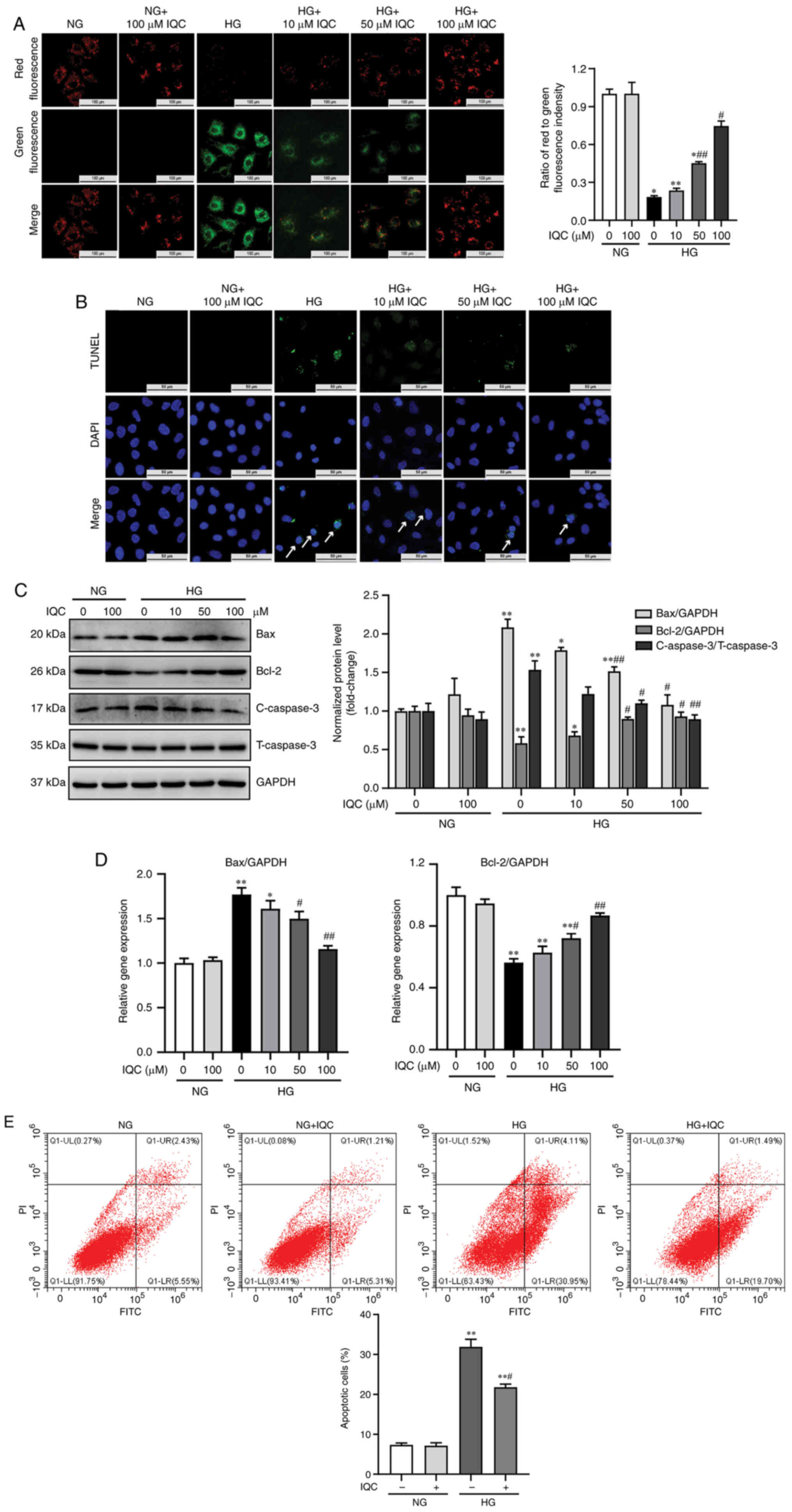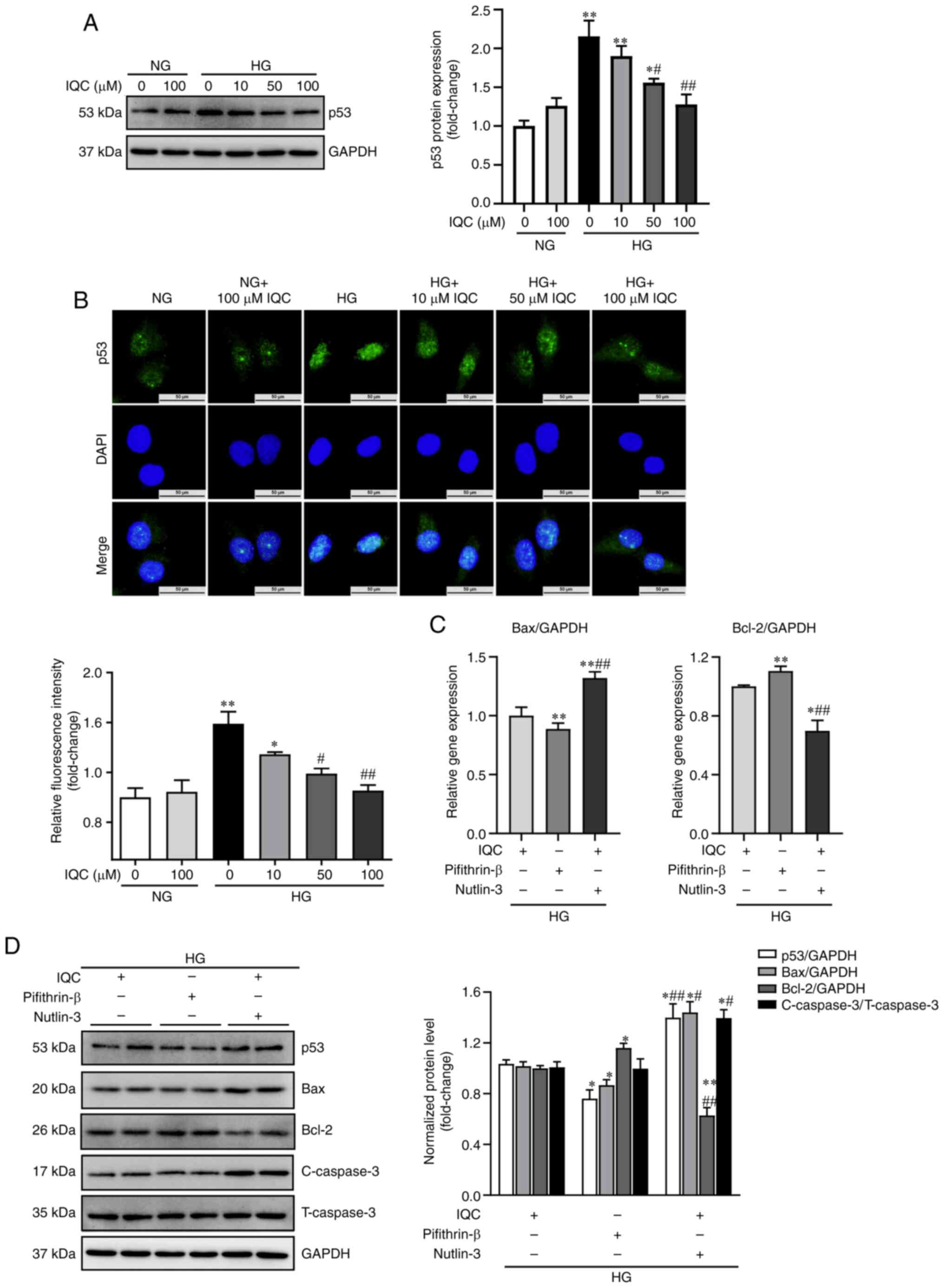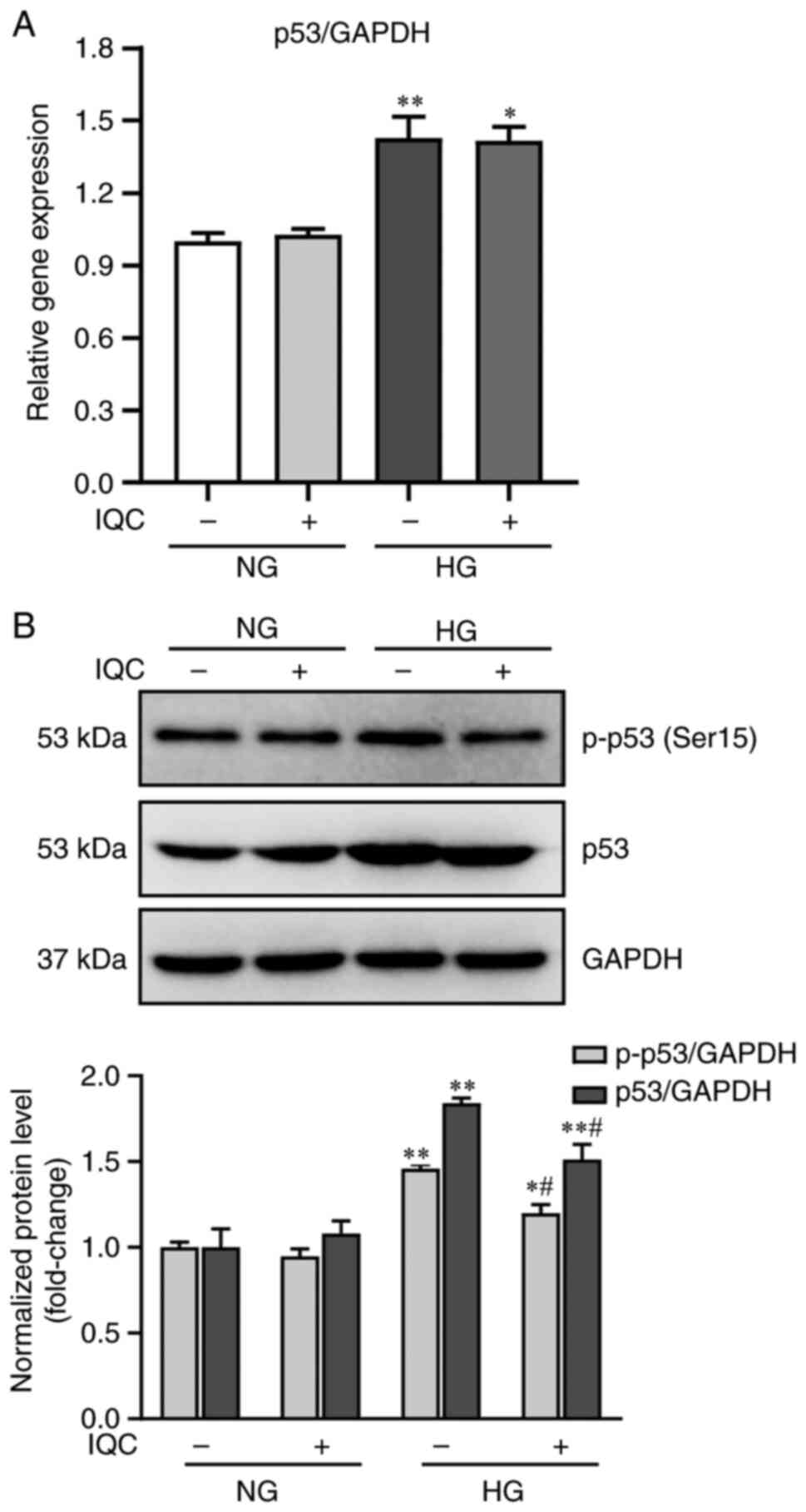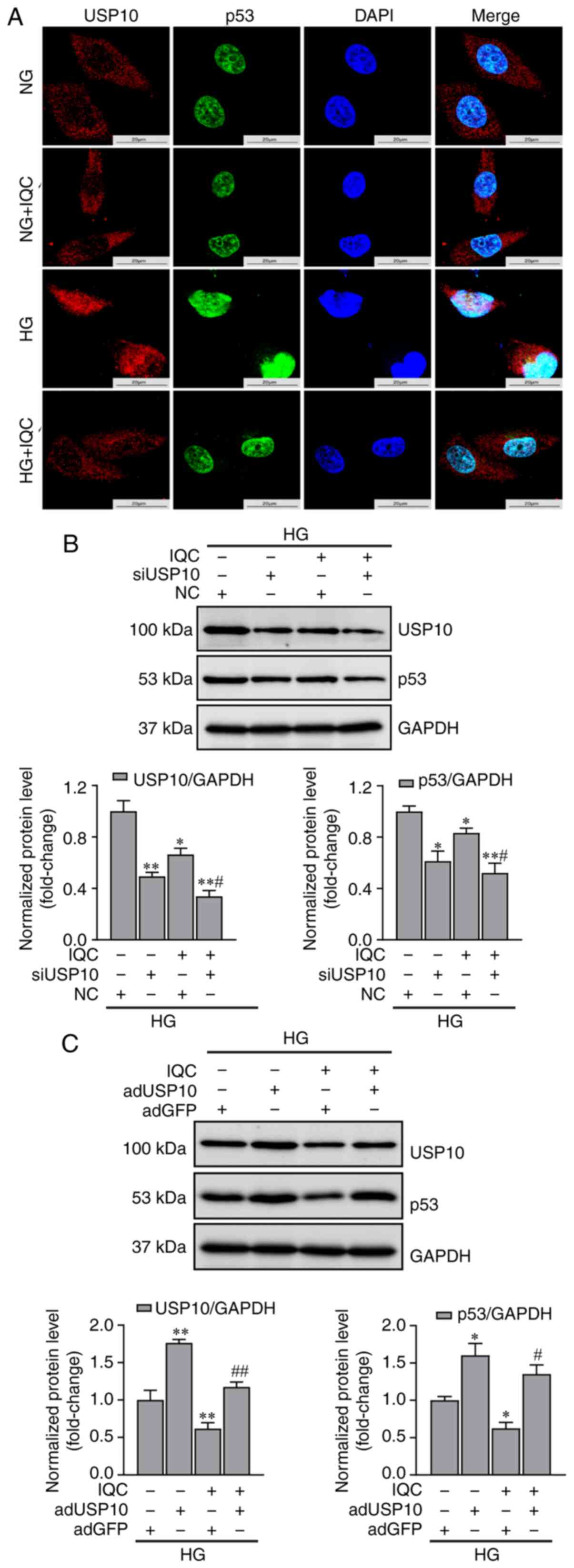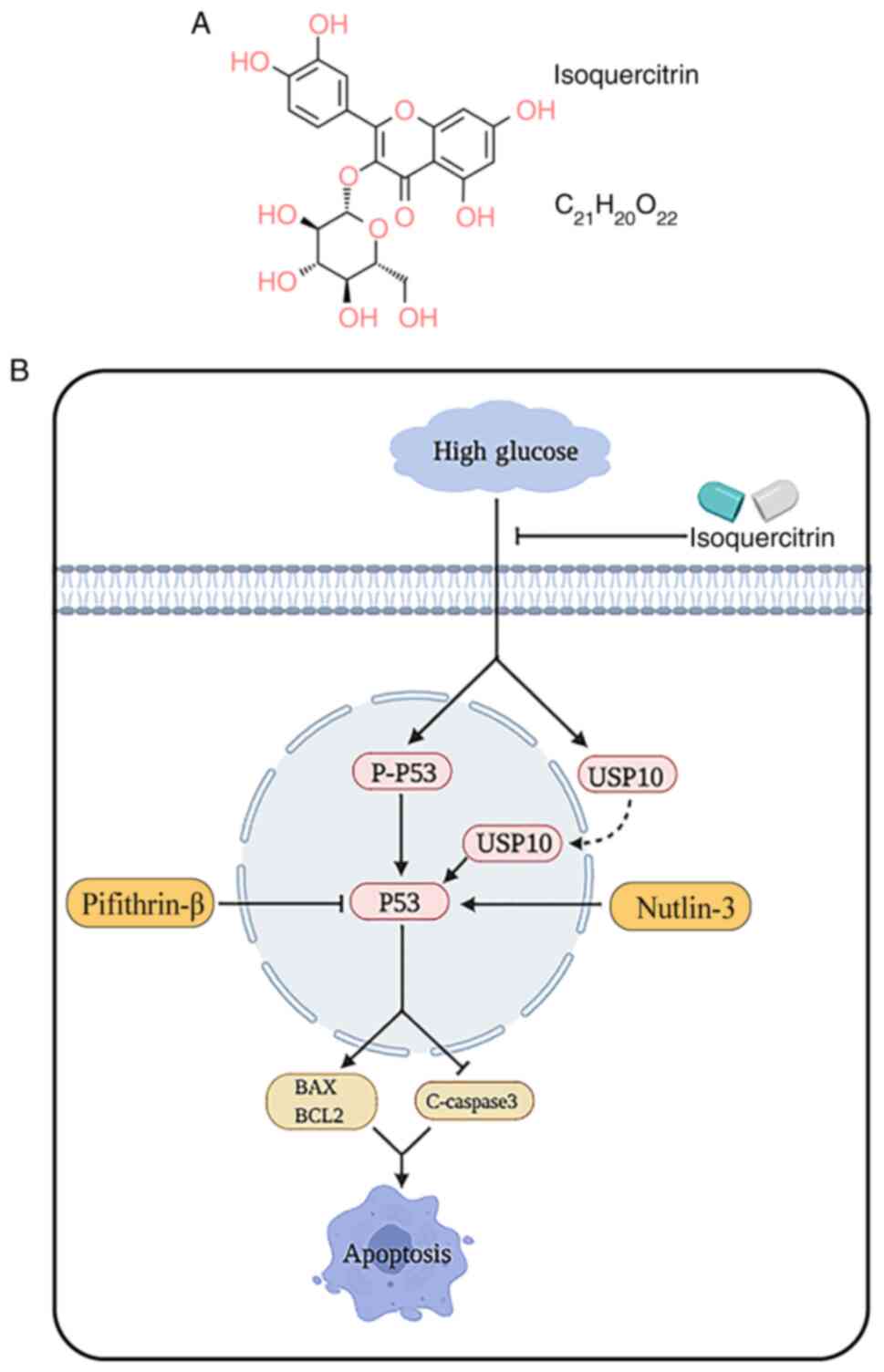|
1
|
Schmidt AM: Highlighting diabetes
mellitus: The epidemic continues. Arterioscler Thromb Vasc Biol.
38:e1–e8. 2018. View Article : Google Scholar
|
|
2
|
Eelen G, de Zeeuw P, Simons M and
Carmeliet P: Endothelial cell metabolism in normal and diseased
vasculature. Circ Res. 116:1231–1244. 2015. View Article : Google Scholar : PubMed/NCBI
|
|
3
|
Yu S, Liu X, Men L, Yao J, Xing Q and Du
J: Selenoprotein S protects against high glucose-induced vascular
endothelial apoptosis through the PKCβII/JNK/Bcl-2 pathway. J Cell
Biochem. Nov 28–2018.Online ahead of print.
|
|
4
|
Watson EC, Grant ZL and Coultas L:
Endothelial cell apoptosis in angiogenesis and vessel regression.
Cell Mol Life Sci. 74:4387–4403. 2017. View Article : Google Scholar : PubMed/NCBI
|
|
5
|
Zhang Y, Lv X, Hu Z, Ye X, Zheng X, Ding
Y, Xie P and Liu Q: Protection of Mcc950 against
high-glucose-induced human retinal endothelial cell dysfunction.
Cell Death Dis. 8:e29412017. View Article : Google Scholar : PubMed/NCBI
|
|
6
|
Han X, Wang B, Sun Y, Huang J, Wang X, Ma
W, Zhu Y, Xu R, Jin H and Liu N: Metformin modulates high
glucose-incubated human umbilical vein endothelial cells
proliferation and apoptosis through AMPK/CREB/BDNF pathway. Front
Pharmacol. 9:12662018. View Article : Google Scholar : PubMed/NCBI
|
|
7
|
Gu J, Huang W, Zhang W, Zhao T, Gao C, Gan
W, Rao M, Chen Q, Guo M, Xu Y and Xu YH: Sodium butyrate alleviates
high-glucose-induced renal glomerular endothelial cells damage via
inhibiting pyroptosis. Int Immunopharmacol. 75:1058322019.
View Article : Google Scholar : PubMed/NCBI
|
|
8
|
Zhao X, Su L, He X, Zhao B and Miao J:
Long noncoding RNA CA7-4 promotes autophagy and apoptosis via
sponging MIR877-3P and MIR5680 in high glucose-induced vascular
endothelial cells. Autophagy. 16:70–85. 2020. View Article : Google Scholar :
|
|
9
|
Ko YS, Jin H, Park SW and Kim HJ:
Salvianolic acid B protects against oxLDL-induced endothelial
dysfunction under high-glucose conditions by downregulating
ROCK1-mediated mitophagy and apoptosis. Biochem Pharmacol.
174:1138152020. View Article : Google Scholar
|
|
10
|
Wei H, Cao C, Wei X, Meng M, Wu B, Meng L,
Wei X, Gu S and Li H: Circular RNA circVEGFC accelerates high
glucose-induced vascular endothelial cells apoptosis through
miR-338-3p/HIF-1α/VEGFA axis. Aging (Albany NY). 12:14365–14375.
2020. View Article : Google Scholar
|
|
11
|
Yi J and Gao ZF: MicroRNA-9-5p promotes
angiogenesis but inhibits apoptosis and inflammation of high
glucose-induced injury in human umbilical vascular endothelial
cells by targeting CXCR4. Int J Biol Macromol. 130:1–9. 2019.
View Article : Google Scholar : PubMed/NCBI
|
|
12
|
Valentová K, Vrba J, Bancířová M,
Ulrichová J and Křen V: Isoquercitrin: Pharmacology, toxicology,
and metabolism. Food Chem Toxicol. 68:267–282. 2014. View Article : Google Scholar : PubMed/NCBI
|
|
13
|
Huang SH, Xu M, Wu HM, Wan CX, Wang HB, Wu
QQ, Liao HH, Deng W and Tang QZ: Isoquercitrin attenuated cardiac
dysfunction via AMPKα-dependent pathways in LPS-treated mice. Mol
Nutr Food Res. 62:e18009552018. View Article : Google Scholar
|
|
14
|
Ma C, Jiang Y, Zhang X, Chen X, Liu Z and
Tian X: Isoquercetin ameliorates myocardial infarction through
anti-inflammation and anti-apoptosis factor and regulating
TLR4-NF-κB signal pathway. Mol Med Rep. 17:6675–6680.
2018.PubMed/NCBI
|
|
15
|
Gasparotto Junior A, Dos Reis Piornedo R,
Assreuy J and Da Silva-Santos JE: Nitric oxide and Kir6.1 potassium
channel mediate isoquercitrin-induced endothelium-dependent and
independent vasodilation in the mesenteric arterial bed of rats.
Eur J Pharmacol. 788:328–334. 2016. View Article : Google Scholar : PubMed/NCBI
|
|
16
|
Bondonno NP, Bondonno CP, Ward NC, Woodman
RJ, Hodgson JM and Croft KD: Enzymatically modified isoquercitrin
improves endothelial function in volunteers at risk of
cardiovascular disease. Br J Nutr. 123:182–189. 2020. View Article : Google Scholar
|
|
17
|
Jayachandran M, Wu Z, Ganesan K, Khalid S,
Chung SM and Xu B: Isoquercetin upregulates antioxidant genes,
suppresses inflammatory cytokines and regulates AMPK pathway in
streptozotocin-induced diabetic rats. Chem Biol Interact.
303:62–69. 2019. View Article : Google Scholar : PubMed/NCBI
|
|
18
|
Niu C, Chen Z, Kim KT, Sun J, Xue M, Chen
G, Li S, Shen Y, Zhu Z, Wang X, et al: Metformin alleviates
hyperglycemia-induced endothelial impairment by downregulating
autophagy via the hedgehog pathway. Autophagy. 15:843–870. 2019.
View Article : Google Scholar : PubMed/NCBI
|
|
19
|
Yu L, Liang Q, Zhang W, Liao M, Wen M,
Zhan B, Bao H and Cheng X: HSP22 suppresses diabetes-induced
endothelial injury by inhibiting mitochondrial reactive oxygen
species formation. Redox Biol. 21:1010952019. View Article : Google Scholar : PubMed/NCBI
|
|
20
|
Liu J, Meng Z, Gan L, Guo R, Gao J, Liu C,
Zhu D, Liu D, Zhang L, Zhang Z, et al: C1q/TNF-related protein 5
contributes to diabetic vascular endothelium dysfunction through
promoting Nox-1 signaling. Redox Biol. 34:1014762020. View Article : Google Scholar : PubMed/NCBI
|
|
21
|
Christodoulou MS, Colombo F, Passarella D,
Ieronimo G, Zuco V, De Cesare M and Zunino F: Synthesis and
biological evaluation of imidazolo(2,1-b)benzothiazole derivatives,
as potential p53 inhibitors. Bioorg Med Chem. 19:1649–1657. 2011.
View Article : Google Scholar : PubMed/NCBI
|
|
22
|
Zhang Y, Zhang Q, Zeng SX, Zhang Y, Mayo
LD and Lu H: Inauhzin and Nutlin3 synergistically activate p53 and
suppress tumor growth. Cancer Biol Ther. 13:915–924. 2012.
View Article : Google Scholar : PubMed/NCBI
|
|
23
|
Livak KJ and Schmittgen TD: Analysis of
relative gene expression data using real-time quantitative PCR and
the 2(-Delta Delta C(T)) method. Methods. 25:402–408. 2001.
View Article : Google Scholar
|
|
24
|
Kwon SK, Saindane M and Baek KH: p53
stability is regulated by diverse deubiquitinating enzymes. Biochim
Biophys Acta Rev Cancer. 1868:404–411. 2017. View Article : Google Scholar : PubMed/NCBI
|
|
25
|
Domingueti CP, Dusse LM, Carvalho MD, de
Sousa LP, Gomes KB and Fernandes AP: Diabetes mellitus: The linkage
between oxidative stress, inflammation, hypercoagulability and
vascular complications. J Diabetes Complications. 30:738–745. 2016.
View Article : Google Scholar : PubMed/NCBI
|
|
26
|
Elshaer SL, Lemtalsi T and El-Remessy AB:
High glucose-mediated tyrosine nitration of PI3-Kinase: A molecular
switch of survival and apoptosis in endothelial cells. Antioxidants
(Basel). 7:472018. View Article : Google Scholar
|
|
27
|
Liu C, Yao MD, Li CP, Shan K, Yang H, Wang
JJ, Liu B, Li XM, Yao J, Jiang Q and Yan B: Silencing of circular
RNA-ZNF609 ameliorates vascular endothelial dysfunction.
Theranostics. 7:2863–2877. 2017. View Article : Google Scholar : PubMed/NCBI
|
|
28
|
Kim JH, Lee S and Cho EJ: The protective
effects of acer okamotoanum and Isoquercitrin on obesity and
amyloidosis in a mouse model. Nutrients. 12:13532020. View Article : Google Scholar :
|
|
29
|
Resham K, Khare P, Bishnoi M and Sharma
SS: Neuroprotective effects of isoquercitrin in diabetic neuropathy
via Wnt/β-catenin signaling pathway inhibition. Biofactors.
46:411–420. 2020. View Article : Google Scholar : PubMed/NCBI
|
|
30
|
Chen L, Feng P, Peng A, Qiu X, Lai W,
Zhang L and Li W: Protective effects of isoquercitrin on
streptozotocin-induced neurotoxicity. J Cell Mol Med.
24:10458–10467. 2020. View Article : Google Scholar : PubMed/NCBI
|
|
31
|
Dai Y, Zhang H, Zhang J and Yan M:
Isoquercetin attenuates oxidative stress and neuronal apoptosis
after ischemia/reperfusion injury via Nrf2-mediated inhibition of
the NOX4/ROS/NF-κB pathway. Chem Biol Interact. 284:32–40. 2018.
View Article : Google Scholar : PubMed/NCBI
|
|
32
|
Dong Y, Chen H, Gao J, Liu Y, Li J and
Wang J: Molecular machinery and interplay of apoptosis and
autophagy in coronary heart disease. J Mol Cell Cardiol. 136:27–41.
2019. View Article : Google Scholar : PubMed/NCBI
|
|
33
|
Bykov VJ, Issaeva N, Shilov A, Hultcrantz
M, Pugacheva E, Chumakov P, Bergman J, Wiman KG and Selivanova G:
Restoration of the tumor suppressor function to mutant p53 by a
low-molecular-weight compound. Nat Med. 8:282–288. 2002. View Article : Google Scholar : PubMed/NCBI
|
|
34
|
Gao Y, Yin H, Zhang Y, Dong Y, Yang F, Wu
X and Liu H: Dexmedetomidine protects hippocampal neurons against
hypoxia/reoxygenation-induced apoptosis through activation
HIF-1α/p53 signaling. Life Sci. 232:1166112019. View Article : Google Scholar
|
|
35
|
Schisano B, Tripathi G, McGee K, McTernan
PG and Ceriello A: Glucose oscillations, more than constant high
glucose, induce p53 activation and a metabolic memory in human
endothelial cells. Diabetologia. 54:1219–1226. 2011. View Article : Google Scholar : PubMed/NCBI
|
|
36
|
Li Q, Pang L, Shi H, Yang W, Liu X, Su G
and Dong Y: High glucose concentration induces retinal endothelial
cell apoptosis by activating p53 signaling pathway. Int J Clin Exp
Pathol. 11:2401–2407. 2018.PubMed/NCBI
|
|
37
|
Wu Y, Lee S, Bobadilla S, Duan SZ and Liu
X: High glucose-induced p53 phosphorylation contributes to
impairment of endothelial antioxidant system. Biochim Biophys Acta
Mol Basis Dis. 1863:2355–2362. 2017. View Article : Google Scholar : PubMed/NCBI
|
|
38
|
Chan WH and Wu HJ: Methylglyoxal and high
glucose co-treatment induces apoptosis or necrosis in human
umbilical vein endothelial cells. J Cell Biochem. 103:1144–1157.
2008. View Article : Google Scholar
|
|
39
|
Si R, Zhang Q, Tsuji-Hosokawa A, Watanabe
M, Willson C, Lai N, Wang J, Dai A, Scott BT, Dillmann WH, et al:
Overexpression of p53 due to excess protein O-GlcNAcylation is
associated with coronary microvascular disease in type 2 diabetes.
Cardiovasc Res. 116:1186–1198. 2020. View Article : Google Scholar :
|
|
40
|
Ao H, Liu B, Li H and Lu L: Egr1 mediates
retinal vascular dysfunction in diabetes mellitus via promoting p53
transcription. J Cell Mol Med. 23:3345–3356. 2019. View Article : Google Scholar : PubMed/NCBI
|
|
41
|
Da Pozzo E, La Pietra V, Cosimelli B, Da
Settimo F, Giacomelli C, Marinelli L, Martini C, Novellino E,
Taliani S and Greco G: p53 functional inhibitors behaving like
pifithrin-β counteract the Alzheimer peptide non-β-amyloid
component effects in human SH-SY5Y cells. ACS Chem Neurosci.
5:390–399. 2014. View Article : Google Scholar : PubMed/NCBI
|
|
42
|
Chen DZ, Wang WW, Chen YL, Yang XF, Zhao M
and Yang YY: miR-128 is upregulated in epilepsy and promotes
apoptosis through the SIRT1 cascade. Int J Mol Med. 44:694–704.
2019.PubMed/NCBI
|
|
43
|
Kelly RM, Goren EM, Taylor PA, Mueller SN,
Stefanski HE, Osborn MJ, Scott HS, Komarova EA, Gudkov AV,
Holländer GA and Blazar BR: Short-term inhibition of p53 combined
with keratinocyte growth factor improves thymic epithelial cell
recovery and enhances T-cell reconstitution after murine bone
marrow transplantation. Blood. 115:1088–1097. 2010. View Article : Google Scholar :
|
|
44
|
Jung SH, Kim BJ, Lee EH and Osborne NN:
Isoquercitrin is the most effective antioxidant in the plant Thuja
orientalis and able to counteract oxidative-induced damage to a
transformed cell line (RGC-5 cells). Neurochem Int. 57:713–721.
2010. View Article : Google Scholar : PubMed/NCBI
|
|
45
|
Taha KF, Khalil M, Abubakr MS and Shawky
E: Identifying cancer-related molecular targets of Nandina
domestica Thunb. by network pharmacology-based analysis in
combination with chemical profiling and molecular docking studies.
J Ethnopharmacol. 249:1124132020. View Article : Google Scholar
|
|
46
|
Jung JH, Lee H, Zeng SX and Lu H: RBM10, a
new regulator of p53. Cells. 9:21072020. View Article : Google Scholar :
|
|
47
|
Saint-Germain E, Mignacca L, Vernier M,
Bobbala D, Ilangumaran S and Ferbeyre G: SOCS1 regulates senescence
and ferroptosis by modulating the expression of p53 target genes.
Aging (Albany NY). 9:2137–2162. 2017. View Article : Google Scholar
|
|
48
|
Liu Y, Tavana O and Gu W: p53
modifications: Exquisite decorations of the powerful guardian. J
Mol Cell Biol. 11:564–577. 2019. View Article : Google Scholar : PubMed/NCBI
|
|
49
|
Shieh SY, Ikeda M, Taya Y and Prives C:
DNA damage-induced phosphorylation of p53 alleviates inhibition by
MDM2. Cell. 91:325–334. 1997. View Article : Google Scholar : PubMed/NCBI
|
|
50
|
Momand J, Zambetti GP, Olson DC, George D
and Levine AJ: The mdm-2 oncogene product forms a complex with the
p53 protein and inhibits p53-mediated transactivation. Cell.
69:1237–1245. 1992. View Article : Google Scholar : PubMed/NCBI
|
|
51
|
Liu J, Xia H, Kim M, Xu L, Li Y, Zhang L,
Cai Y, Norberg HV, Zhang T, Furuya T, et al: Beclin1 controls the
levels of p53 by regulating the deubiquitination activity of USP10
and USP13. Cell. 147:223–234. 2011. View Article : Google Scholar : PubMed/NCBI
|
|
52
|
Yuan J, Luo K, Zhang L, Cheville JC and
Lou Z: USP10 regulates p53 localization and stability by
deubiquitinating p53. Cell. 140:384–396. 2010. View Article : Google Scholar : PubMed/NCBI
|
|
53
|
Deng CC, Zhu DH, Chen YJ, Huang TY, Peng
Y, Liu SY, Lu P, Xue YH, Xu YP, Yang B and Rong Z: TRAF4 promotes
fibroblast proliferation in keloids by destabilizing p53 via
interacting with the deubiquitinase USP10. J Invest Dermatol.
139:1925–1935.e5. 2019. View Article : Google Scholar
|
|
54
|
Honda R, Tanaka H and Yasuda H:
Oncoprotein MDM2 is a ubiquitin ligase E3 for tumor suppressor p53.
FEBS Lett. 420:25–27. 1997. View Article : Google Scholar
|
|
55
|
Carmona V, Martín-Aragón S, Goldberg J,
Schubert D and Bermejo-Bescós P: Several targets involved in
Alzheimer's disease amyloidogenesis are affected by morin and
isoquercitrin. Nutr Neurosci. 23:575–590. 2020. View Article : Google Scholar
|















